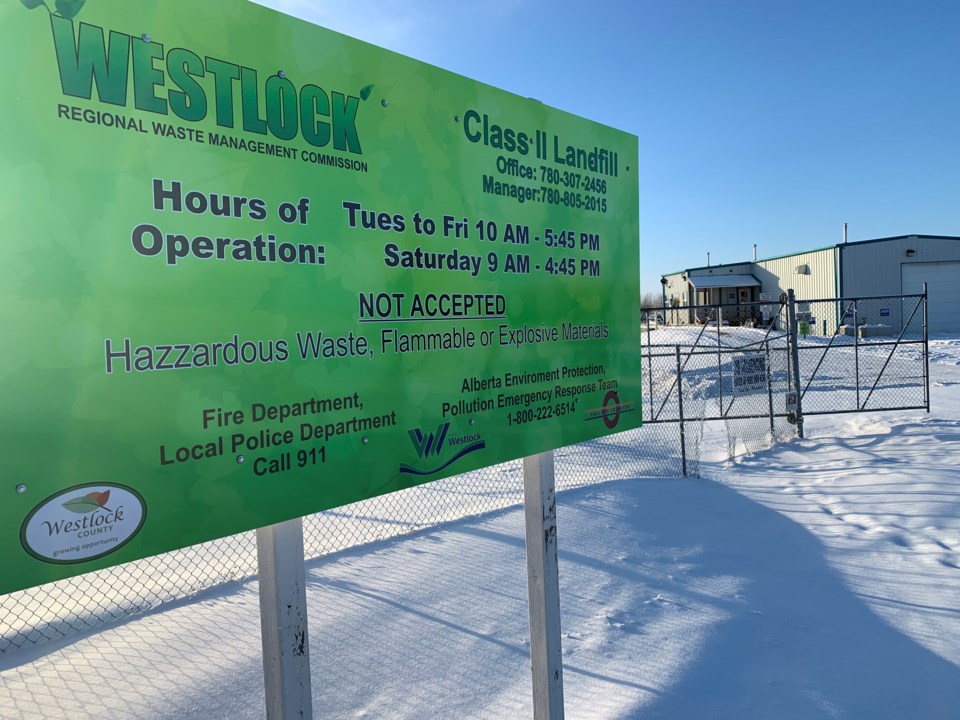WESTLOCK — The Westlock Regional Waste Management Commission has approved a memorandum of understanding with Alternative Root, the future operators of a compost facility at the Westlock Regional Landfill.
The proposal from a group of local farmers to set up the facility has also gone through a provincial appeal process May 7 after landowners near the landfill raised concerns regarding odour and increased traffic on the landfill road.
The Municipal Government Board denied the appeal last week, and Alternative Root can now apply for a permit through Alberta Environment and Parks, which part-owner Colby Hansen says can take two to three weeks for approval. Pending all permits, Hansen expects they’ll start construction mid-June.
“This takes the commission further down on its strategic plan, on things we want to do to be innovative, think outside the box,” said waste commission board chair Curtis Snell at a May 19 waste commission meeting.
“I think it’s going to serve the overall community, the Village (of Clyde), (Westlock) county and the Town (of Westlock), because that’s what we’re there for, to try to meet the needs, and this is the next need we’ve identified and luckily something came forward with that.”
According to the MGB decision filed May 19, the appeal was prompted by news articles about compost facilities in in the Edmonton region that had caused problems with odour, microplastic-contaminated compost, more traffic and pests.
“The appeal went the way we were expecting. As a group, the whole time we’ve been developing this process, we’ve been striving to do things right. We have full confidence that we are in compliance, and our whole project is based around being a better steward of the environment,” Hansen said in a May 28 interview.
“Everybody has concerns, and that’s good. We addressed those concerns so we were very happy with the outcome.”
Moore and Hansen said the new provincial composting guidelines, which went into effect at the end of April, have influenced the design for the proposed facility here, and they go further in addressing the neighbour’s issues.
“In the past, they were very vague in the actual design, now the criteria is a bit stricter,” Moore said. “Odour control, all these issues that they brought up are addressed in these new standards for compost facilities here in Alberta. I thought (the appeal board meeting) went pretty well.”
As for more trucks on the road, Moore said the neighbour seemed satisfied to learn that the projection is for five more trucks per day, and the landfill now can range from 75 to 250 per day.
“They had an understanding of five trucks, multiple trips in a day I think was their understanding. Once they realized it’s only five more trucks on the road, and that we do pay extra for grading from time to time to the county, I think it kind of helped them a little bit on those concerns,” Moore told the waste commission.
Westlock County’s municipal planning commission unanimously approved the project March 16 subject to a number of conditions recommended by development manager Kathleen Deshoux, including an agreement with the county to address road use and road access, site drainage, landscaping and fencing.
Alterantive Root will be responsible for any environmental contamination; they also can’t alter existing drainage where water drains onto neighbouring properties, and fix drainage structures where that happens; and they can’t burn, cut, destroy or remove trees, shrubs or natural vegetation without confirmation from the county.
Moore said the new facility won’t increase revenues by much, but will lead to substantial savings. Alternative Root will be using the wood that normally gets burned, it’ll divert compostable material from the landfill, and reduce the commission’s labour costs for site maintenance.
“The idea is to add more jobs to our region as well as helping meet some of the needs of the grocery stores and some of those things, a lot of their stuff is now going to the landfill,” Moore said.
Board member John Shoemaker added: “With all the financial background of everyone on this committee, we all realize increased revenue or decreased expenses all affect our bottom line, and decreased expenses is always good.”
Under Phase 1, the facility will accept up to 12,000 tons of material per year, and up to 20,000 tons during Phase 2.
“We’re very grateful to be working with Tom and the waste commission. They're very forward thinking, Westlock is lucky to have a waste commission like that, and a manager like Tom who’s committed to making the environment a better place and reusing and utilizing waste for something good.



